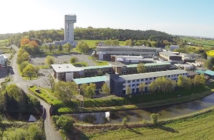by Dave Watkinson www.watkinsonblack.com
HOPEFULLY, we are now all beginning to look forward to a continued return to normality after the horrendous year which we have all just endured, and the government is encouraging us all to look forward.
In Rishi Sunak’s Budget Statement on 3 March, he put in place some fiscal tax measures that he hopes will encourage investment and kick-start the economy in readiness for the post-pandemic and post-Brexit era, one of the most important of which was the super deduction in respect of expenditure on capital investments.
The remainder of this article, of course, only applies to businesses and not to people in employment. There are also two other very important exclusions. Firstly, both the super deduction and the 50% First Year Allowance for special rate pool plant and machinery discussed below are only available to companies, so sole traders, partnerships and LLPs do not qualify. Secondly, these reliefs are also only available for contracts entered into after 3 March 2021, so projects that have already been committed to before or during the course of the pandemic, and may have been mothballed for obvious reasons, will not qualify.
The super deduction allows companies to claim a 130% first-year allowance (FYA) for investment incurred on ‘main pool’ items of plant and machinery acquired in the period between 1 April 2021 and 31 March 2023. This includes the more obvious items of plant and machinery like manufacturing equipment, machines and computers, but it also extends to items of main pool plant and machinery that are fixtures in properties.
Investment in new plant and machinery may also include some construction expenditure incurred on new or refurbished buildings. The super deduction may also be available for a proportion of these expenses. This point is often overlooked but it could be a stimulus to commence building works in the period.
As well as the super deduction is a 50% First Year Allowance for expenditure incurred on special rate pool items of plant or machinery, which includes integral features, solar panels and thermal insulation.
There are three further conditions that apply to both the super deduction and the 50& FYA:
· Both are only available for plant and machinery that is new and unused;
· Neither applies to assets purchased second-hand; and
· Relief is time apportioned for accounting periods that straddle 1 April 2021 and 31 March 2023.
There are also two very important caveats and omissions that might make the super deduction less attractive than at first sight.
Firstly, the measures are not available to landlords investing in the construction of new property or the refurbishment of existing premises. Omission of such a large sector that could, in turn, have a stimulating impact on many related sectors of the economy in the supply chain supporting the construction industry may be an unintended consequence of the legislation as it seems to be contradictory to the intention of the measures.
Secondly, long-life assets and cars are also excluded, but vehicles not deemed to be cars, such as vans, motorbikes etc. that are used for trading purposes, are within the scope of the measure.
The measures only apply to expenditure incurred from 1 April 2021 until 31 March 2023 so companies will only receive the FYAs during the time when the 19% corporation tax rate applies.
Clearly, the next two years may not be that profitable for a lot of companies as they emerge from the pandemic period. However, even if the level of profits might not warrant the need for increased levels of capital allowances over the next two years, claiming the first year increased capital allowances may lead to a tax loss. When the corporation tax rate increases to 25% from 1 April 2023 (or the expected marginal rate of 26.5% for companies with profits between £50,000 and £250,000) any losses incurred in the next two years can be carried forward into the more punitive tax rate periods, thereby reducing the effects of these future tax increases.
Another major consequence of the application of the super deduction and special rate FYAs relates to disposal values when assets are sold or disposed of.
Items of plant and machinery are ordinarily added to a pool and writing-down allowances of either 18% for main pool items, or 6% for special rate pool items are claimed from the pool. Assets that are disposed of reduce the total relevant pool amount and therefore the allowances claimed. However, because the super deduction and 50% special rate measures are FYAs, they are not pooled and, herefore, when an asset is sold in the period up to 31 March 2023 then that could result in an immediate balancing charge, with 130% of the cost being clawed back and declared as taxable income.
In conclusion, the super deduction measures could provide a very positive stimulus for investment in the UK economy as it attempts to recover in the next two years and beyond. However, as made clear in the article above, there are a number of points that need to be considered if companies are to take maximum strategic advantage of the relief
WatkinsonBlack have considerable experience in all areas of taxation and business services, including providing a very cost-effective payroll bureau service. If you want to arrange a no-obligation initial meeting on any taxation or accounting matter then please contact us. Please note that these ideas are intended to inform rather than advise and you should always obtain professional advice before taking any action.




